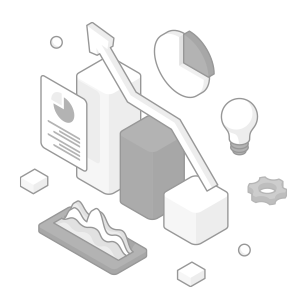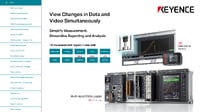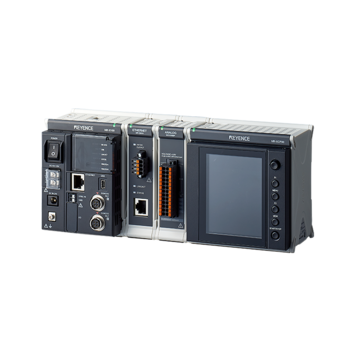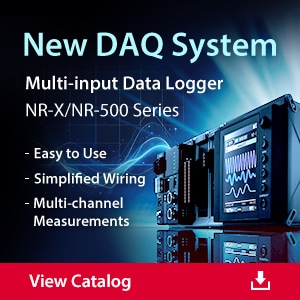Data Acquisition (DAQ)
What is Data Logging?
-
Tags:
- Data Acquisition
A data logger records data from sensors and is commonly used to monitor production environments or track machine health; their captured data helps spot trends and anomalies while providing valuable insights.
Understanding Data Logging: What It is and How It Works
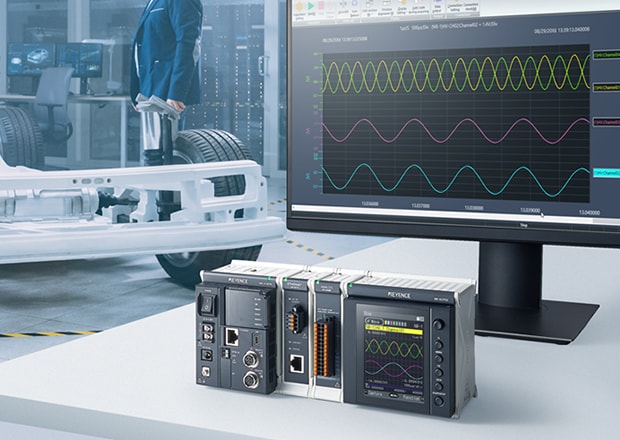
Data logging is the process of collecting and storing data over time; it involves using data loggers equipped with sensors to measure physical parameters such as temperature, pressure, and humidity. Some sensors gather data and store it into the logger’s memory while others send data over USB or via wireless systems.
We’re here to provide you with more details.
Reach out today!
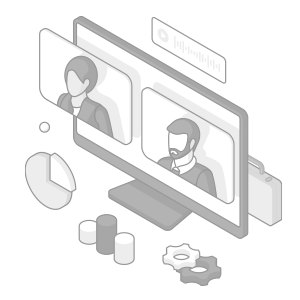
Types of Data Loggers
Data loggers come in several varieties depending on need. The most common types are:
- Standalone Data Loggers: These are self-contained units that operate independently without the need for a computer; they are portable, often battery-powered, and suitable for remote or temporary monitoring. The NR-X100 data logger from KEYENCE can be used completely stand alone by using the attachable control panel, battery pack, and SD Card Storage.
- Wireless Data Loggers: These loggers transmit data wirelessly to cloud systems or mobile devices. Wireless loggers provide real-time data monitoring, making them ideal for applications requiring constant updates.
- Computer-Based Data Loggers: These loggers are connected to a computer and often used in controlled environments. Data is typically transferred via USB for real-time monitoring and analysis. The NR-500 data logger from KEYENCE is the worlds most compact PC- based data loggers. Even with its small size, it can loge up to 64 channels simultaneously.
- Web-Based Data Loggers: A web-based logger allows remote monitoring via a browser, with data sent to an online server for storage and analysis; these loggers provide easy access to data from any device.
Data Logging vs. Data Acquisition Systems (DAQ)
Both data loggers and data acquisition (DAQ) systems collect and store data. However, data loggers are compact, portable devices that can function independently from a wired system. In contrast, DAQ systems often need to be connected to a computer, making them more suited for high-volume, real-time data processing.
What is a Data Logger? Functions and Applications
A data logger records data from sensors and is commonly used to monitor production environments or track machine health; their captured data helps spot trends and anomalies while providing valuable insights.
Discover more about this product.
Click here to book your demo.

How Industrial Data Loggers Improve Monitoring and Analysis
Data loggers automate industrial data collection and improve monitoring by supporting the analysis of historical data and helping identify patterns to prevent potential issues.
Key Features of a Reliable Data Logging System
Data logging systems have several key features, some of which are a long-lasting battery, ample memory capacity, and a system that was designed with ease of use in mind, offering a simple interface for quick setup and operation.
Common Applications of Data Logging in Industrial Settings
Data loggers are used across various industrial applications. For example, in geotechnical monitoring, they track ground movements like seismic activity, and in cold chain monitoring, they monitor temperature and humidity levels in transport trucks.
The Role of Data Logging Sensors in Automated Monitoring
Automated data logging sensors are used by businesses to monitor the physical conditions of a production line; like temperature, vibration, and sound data. Once this process is automated, there is no need for constant human intervention, which saves time and money.
Choosing the Right Data Logger
Selecting the right data logger depends on several factors: the type of data, the number of sensors needed, and the environment. For instance, multichannel loggers are ideal for applications that require simultaneous measurement of multiple parameters.
Enhance your data collection with KEYENCE’s advanced data logging solutions, optimize monitoring today!
Contact us to learn more about how our advanced technology can help take your business to the next level.
Contact Us